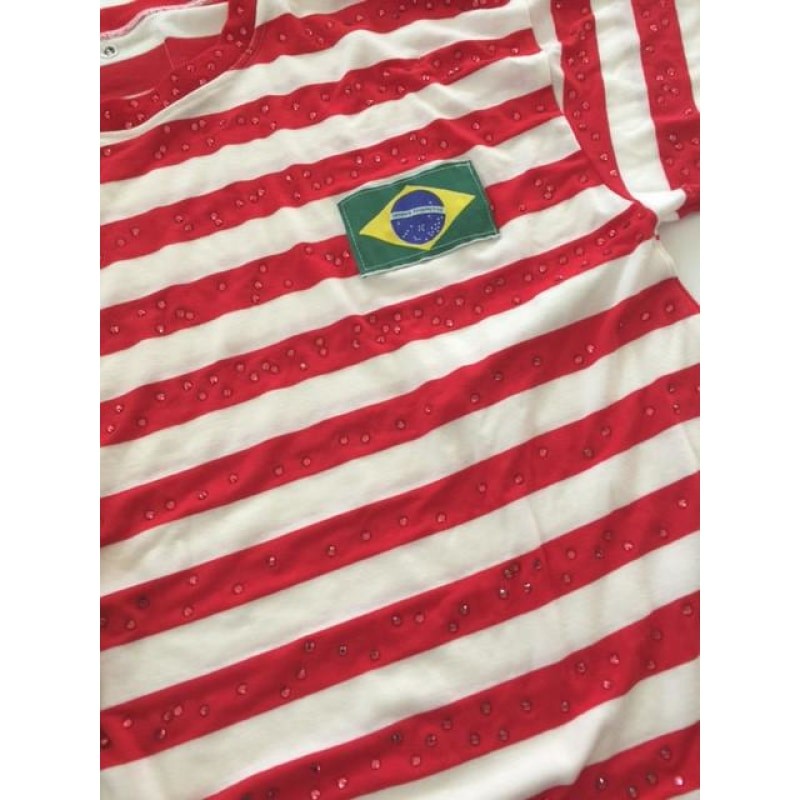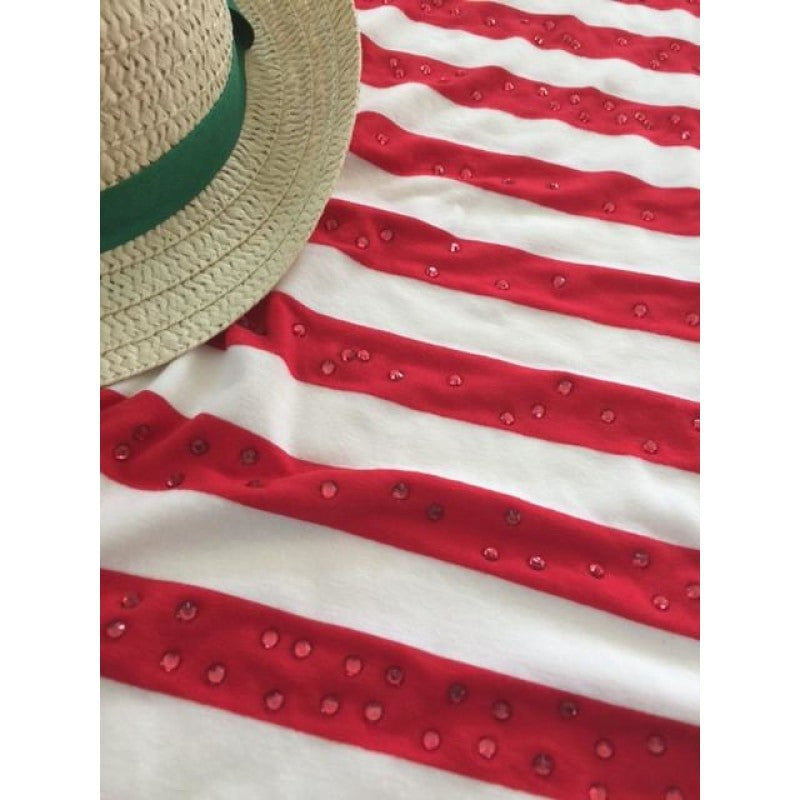
Malandro Samba Gafieira T-Shirt
$ 75.00 USD
Details
Have a samba group and need Malandro t-shirts? We have them now! This is a soft cotton t-shirt with a slight Lycra to the t-shirt. This is hand made by a local carnival design shop. We can custom make to your school
- Order with or without sparkling hot-fix stones
- Stretch fabric, hand made.
- Beads are wash & dry safe!
- Brazil Flag on the left chest and upper middle back (We can remove it if you wish, or just place it on the front, or just on the back).
- We can make any stripe color you like, contact us via email.
- Small, Medium and Large available.
- We can make any quantities you need, feel free to contact us!

Measurements:
Small: Width 20 'inches/51 cm, Length 27" inches/69 cm
Medium: Width 20’
inches/ 53.4 cm, Length 28 ‘ inches/70.5 cm
Large: Width 22 ‘ inches/56 cm, Length 28 ' inches/ 71 cm
Extra Large: Width 32’ inches/ 81 cm, Length 25’ inches/63.5 cm
What is a Malandro in the samba culture?
Malandragem (Brazilian Portuguese: [malɐ̃ˈdɾaʒẽȷ̃]) is a Portuguese term for a lifestyle of idleness, fast living and petty crime – traditionally celebrated in samba lyrics, especially those of Noel Rosa and Bezerra da Silva. The exponent of this lifestyle, the malandro (masculine adjective), or "bad boy" (rogue, hustler, rascal, scoundrel), has become significant to Brazilian national identity as a folk hero or, rather, an anti-hero. It is common in Brazilian literature, Brazilian cinema and Brazilian music.[1]
Malandragem is defined as an aggregation of strategies utilized in order to gain advantage in a determined situation, these advantages often being illicit. It is characterized by savoir faire and subtlety. Its execution demands aptitude, charisma, cunning and whatever other characteristics (knacks) which help in the manipulation of people or institutions to obtain the best outcome in the easiest possible way.
Disconsidering logical argumentation, labor and honesty, the malandro presupposes that such methods are incapable of getting him a good outcome. Those who practice malandragem act in the manner of the popular Brazilian adage, immortalized in a catch phrase of former Brazilian soccer player Gérson de Oliveira Nunes in a cigarette TV commercial (hence the name it was given: Lei de Gérson, or Gérson's law): “I like to get an advantage in everything.”
Together with the concept of jeitinho, malandragem can be considered another typical — but not exclusive — Brazilian mode of social navigation; unlike jeitinho, however, with malandragem the integrity of institutions and individuals is effectively attacked, legally speaking, as malicious. Successful malandragem is gaining advantage under the condition of not being caught. Basically, the malandro dupes the target without them knowing they have been tricked.
Malandragem is characterized in the Brazilian popular imagination as a tool for individual justice. Facing the forces of oppressive institutions, the individualist malandro survives by manipulating people, fooling authorities and sidestepping laws in a way which guarantees his well-being. In this way, the malandro is a typical Brazilian hero. Literary examples include Pedro Malasarte and João Grilo.
Like jeitinho, malandragem is an intellectual resource utilized by individuals of little social influence or by the socially disadvantaged. This does not stop the equal use of malandragem by those of better social positions. Through malandragem, one gains illicit advantages in gambling, business, and in the totality of their social life. One can consider a malandro the adulterer who convinces a woman of his false fidelity; the employer who finds a way to pay his employees less than what he owes; the player who manipulates his cards and wins the round.
But, despite this apparent egocentrical, lying and malicious nature, the person who makes use of malandragem is not necessarily selfish. He could possibly be lazy, but the malandro is not careless with the people around him. He generally doesn't make use of malandragem to take advantage of another person intending to harm others, but rather only to find a way out of an unfair situation even if this means resorting to illegal methods. In fictional contexts, malandragem is often a device used to introduce wit, a typical plot device/characteristic of an antihero.















